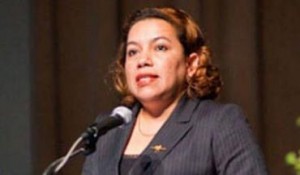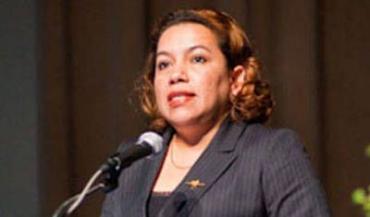
Guyana’s Foreign Affairs Minister Carolyn Rodrigues-Birkett, who assumed chairmanship of the CARICOM Council for Trade and Economic Development (COTED) (Credit: eluniversal)
GEORGETOWN, Guyana, Friday November 8, 2013, CMC – Caribbean Community (CARICOM) trade ministers began a two-day meeting here with a call for the region to energize its external trade policy and explore opportunities in South America as well as deepen trade and investment relations with the African Caribbean Pacific (ACP) Group.
Guyana’s Foreign Affairs Minister Carolyn Rodrigues-Birkett, who assumed chairmanship of the CARICOM Council for Trade and Economic Development (COTED), said it was also necessary for the region, which is not “short on visions, orators and great speeches” to ensure it accelerates the implementations of decisions taken to deepen the regional integration movement.
“The only direction for the Caribbean Community is forward – in all respects of the Treaty’s declared promises and common goals. The Caribbean’s history is replete with instances of regional leadership in the global community. We must rediscover the region’s natural instinct to lead and not merely follow. We are small but not insignificant.”
She noted that last week, Grenada hosted the Caribbean Forum (CARIFORUM) Stakeholders Consultations on the Future Perspectives of the ACP, a grouping of former European colonies that was “birthed right here in Guyana, the brainchild of the Caribbean, and now seeking to review, reform and reinvent itself in the face of global changes”.
She said given the importance of COTED in CARICOM’s development mandate, “cannot afford, and should not be allowed, to operate as business as usual.
“We should initiate critical changes here and this special session must not be another nice conversation. As trade Ministers let us take the tough decisions and commit to the follow through. We owe it to ourselves and the people.
“Let us deliver real value for the people’s investment in the one Caribbean project. In this regard, COTED can and should harness the ideas and input of the Caribbean public in its policymaking and implementation process.
“Let us engage our private sector – our engine of growth, jobs and innovation. We also ask our regional private sector bodies to organize themselves so that we interact with an umbrella body of the Caribbean private sector,” she said, adding it was necessary to “energize our external trade policy and explore opportunities in our neighbourhood in South America”.
She said there was also need to “deepen our trade and investment relations with ACP partners” telling the regional trade ministers “in order to achieve these goals, we have to make some needful adjustments to our mode of operation, to the structure of our meetings, and the prioritization of our agenda”.
The traditional two-day COTED meeting will allow the ministers on Friday to consider the direction the Council should pursue in the current economic environment, with particular emphasis on the prioritization of its agenda for growth and development.
The ministers are also expected to consider a more structured framework for the greater involvement of the Region’s private sector, the enabling environment created by the CARICOM Single Market and Economy (CSME), and boosting competitive production.
On Saturday, they will deal with trade issues affecting the region.
CARICOM Secretary General Irwin La Rocque told the meeting Caribbean countries were searching for answers to alleviate the low levels of growth and high levels of debt.
“We are searching for answers to raise employment levels, particularly among our youth,” he said, noting that the COTED meeting “is therefore set against the background of a quest for innovative ideas to drive the progress of our integration movement.
“After 40 years, our integration movement continues to endure, giving us cause for celebration in the midst of our reflection and introspection. And as any organisation which wishes to remain relevant to its members, we are engaged in seeking ways to improve the way we do business.”
He told the meeting that CARICOM is in the process of reviewing every facet of its operations and institutions and regional leaders had agreed that it was necessary to examine the future direction of the Community and to craft the requisite arrangements to govern the agreed structure.
“COTED’s agenda and deliberations must be more strategic as they seek to address the challenges faced by our member states,” he said, noting also that the deliberations should also be informed by the recent judgment of the Caribbean Court of Justice (CCJ) “which has far-reaching implications for decision making and implementation, the nature and effects of Community law, obligations of member states, and the rights of Community nationals.
“The Court’s judgments have cemented the rules-based system and thereby engendered confidence in the Community arrangements,” La Rocque said in obvious reference to the ruling by the Trinidad-based CCJ that found Barbados had breached the rights of a Jamaican national when she sought entry into the country in 2011.
The CCJ also ordered Barbados to pay compensation of BDS$75,000 (One Barbados Dollar = US$0.50 cents) to Shanique Myrie who alleged that when she travelled to Barbados on March 14, 2011 she was discriminated against because of her nationality, subjected to a body cavity search, detained overnight in a cell and deported to Jamaica the following day.
Myrie also claimed that she was subjected to derogatory remarks by a Barbadian immigration officer and asked the CCJ to determine the minimum standard of treatment applicable to CARICOM citizens moving around the region.
La Rocque told the meeting that every member state which is party to the Revised Treaty of Chaguaramas has agreed to certain rights and obligations, “and if the Community is to deepen its integration process, we all have a responsibility to ensure that we meet our obligations to each other. “However, we must equally be aware of the constraints which may hinder our member states from fulfilling those obligations and responsibilities,” La Rocque said, adding “ as a region we must collectively endeavour to put all our member states on a sound footing in order to tackle the harsh economic realities head on.
“ For CARICOM, enhancing competitiveness and expanding trade are crucial elements for propelling growth and improving the welfare of the Region. We must be fully aware of our challenges and limitations and seek to address these, both at the regional and national levels.
“I speak of challenges such as minimal export diversification and dependency on very few export markets, inadequate infrastructure, low competitiveness, high transport and transit costs, difficulties attracting foreign investment and the list goes on,” La Rocque added.















